The uncomfortable truth about the Springboks 1995 RWC win, told by the man who ushered in racial quotas

Ed Griffiths has never forgotten his moment of clarity in the immediate aftermath of the Springboks’ 1995 World Cup triumph. The fairy tale success memorably went on to become the stuff of Hollywood legend, Morgan Freeman and Matt Damon respectively playing the roles of inspirational South African president Nelson Mandela and team skipper Francois Pienaar.
The actors cinematically re-enacted that wonderfully symbolic moment where the jersey-wearing politician who had been incarcerated on Robben Island for so long at height of apartheid handed the glistening golden trophy over in Johannesburg to the rugby captain of the Rainbow Nation. A country rejoiced as one.
Amid the hoopla, Griffiths realised there and then that the Springboks class of ’95 would never have it so good again. He was sadly right. Within a few years, Mandela and SA Rugby were on opposite sides amid a rumbling race row about rugby’s evolution in South Africa.
The passage of time wasn’t kind to some of the squad either, venerated coach Kitch Christie (leukaemia) and four star players – Ruben Kruger (brain cancer), Joost van der Westhuizen (motor neurone disease), James Small (heart attack) and Chester Williams (heart attack) – the non-white poster boy of the campaign – all tragically passing on early to their eternal rest.
May 25 marks the 25th anniversary of how their swaggering gallop to greatness initially began, defending champions Australia beaten in the tournament opener in Cape Town. Thirty days later, it all culminated in Joel Stransky’s title-clinching drop goal in extra time at Ellis Park.
Cue bedlam… and the sobering realisation from Griffiths that this probably was as good as life would ever get for a special Springboks squad who are still connected all these years later on a busy WhatsApp group where they hope to create some anniversary events to raise funds for people affected by Covid-19.
Casting his thoughts back to the seismic Springboks breakthrough 25 years ago, Griffiths told RugbyPass: “I was saying afterwards to Hennie Le Roux it was an incredibly happy day but it was also a sad day. He said, ‘What do you mean?’ I said, ‘Here we are – I was 32 and he was in his late 20s – and we would probably never have a better day than this in our life. It was probably all downhill from here’.
“It was a bit of negative thing to say but it’s not often that you find yourself in the middle of something that is so obviously historic and significant and you just need to try and enjoy it.”
After the Springboks, Griffiths went on to help transform Saracens from a model of inconsistency into a powerhouse of the English club game in a seven-year stint through to March 2015, a different kind of project he suggested he could talk for hours about. But for now, he happily settled for a rollicking half-hour recall of the ride of his life, an eleventh-month rollercoaster as chief executive of the South African rugby union.
Born in Southern Rhodesia (now Zimbabwe) and raised in England from 18 months old, how Griffiths came to the fore with the Springboks is quite the adventure in itself. An ancient history student at Newcastle who wanted a start in journalism, he figured emigrating to South Africa in 1985 would be a career accelerator rather than slowly building a portfolio at home in the UK. His hunch was perfectly on the money.
“Basically, I went to university and decided I wanted to be a sports reporter. I couldn’t believe it was a job where you could write about sport and get the best seat in the house, get to tell everyone what you thought of the game and get paid for it. I thought that was a great job.
“If I stayed in England I would have been on the M1 at 5 o’clock in the afternoon with a lot of traffic in the way and it quite difficult to get anywhere. I felt that by going to South Africa I would have an opportunity to write at a higher level much more quickly.
“I covered the last Formula 1 Grand Prix at Kyalami two weeks after arriving straight out of university and within a year and a half, I was chief rugby writer and cricket writer on the Sunday Times, the largest newspaper in the country at the time. Within five years I was sports editor.”
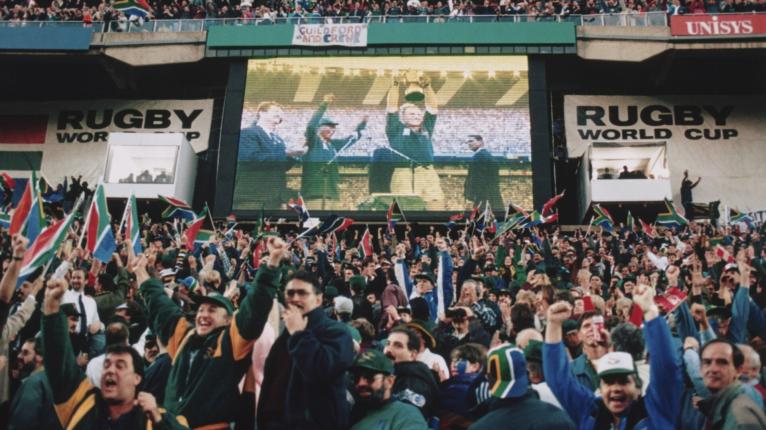
It wasn’t all plain sailing. For instance, he remembered turning up at a match in Bloemfontein and not being allowed in due to some slight taken about his style of reporting. “There were times when it was not easy. South Africa was a society where the alternative view wasn’t tolerated and it wasn’t very popular generally either.”
Come 1995, though, the prevailing mood was that South African rugby needed to put its best foot forward. The world was coming to visit after years of boycott and sporting isolation due to apartheid and rather than have an old-style administrator front of the house, rugby president Louis Luyt reckoned it was time to put on a more compelling Springboks show with a fresher face in Griffiths.
“He saw a gap,” explained Griffiths, taking up the story about how he was parachuted in as SA Rugby CEO that March, just two months before the start of the World Cup after he had served as Springboks team media liaison officer on the European tour the previous November.
“He was involved not in a day to day running but in all the major decisions of the union at the time and he saw me as somebody who had skills in communications and media, somebody who could put a better face on South African rugby, a better public face on South African rugby.
“I saw it as a massive opportunity. I remember saying to someone I could sit in that job for 20 years and not make a hell of a lot of changes and just enjoy the ride, but I saw it as an opportunity to make real and substantial changes and to change the sport which had largely been the standard-bearer of apartheid into the standard-bearer of the new democracy.
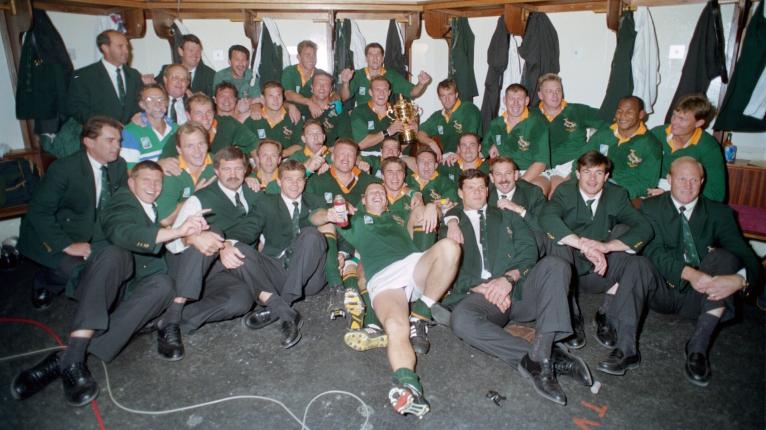
“It was a pivotal time in the history of the country and the World Cup in ’95 gave rugby the opportunity to almost completely reposition itself within the society. What we did during the tournament did that but that opportunity was unfortunately not taken.”
More of that legacy later. First, though, a spin through a multitude of vivid tournament anecdotes, starting with the left-field Griffiths idea that played a major part in getting Mandela on board supporting the Springboks, the team of the white oppressor during the dark days of the divided South African society in the decades prior.
“I knew most of the team pretty well and I certainly knew Francois Pienaar well who as captain was enlightened and saw the opportunity. He completely got the opportunity for South African rugby that certainly not everyone within the game did see. He was always going to a massive force for good in what we were trying to do.
“My responsibility was overseeing the preparations of the Springboks and more importantly the profile of the Springboks team,” explained Griffiths. “That started off with this ‘One Team, One Country’ mantra which was launched before the tournament. It managed to catch on and become a byword for the team.
“The other important thing was about two weeks before the tournament, we announced there was an under-19 team going to tour Romania. I put it to Louis Luyt, not to the full executive, that we should have a quota of black or coloured players in that squad to demonstrate that if selectors weren’t prepared to find black or coloured talent that we would effectively force them to find it.
Excuses still not tolerated all these years later https://t.co/bMWFGtGDGt
— RugbyPass (@RugbyPass) May 23, 2020
“That was the first time there had been any kind of affirmative action in South African rugby to redress the imbalances of the past. Although it didn’t get much publicity at the time, I know that it was certainly noticed by Government and that gesture certainly played a role in Mandela’s decision to get behind the team during the tournament.
“Mandela would have seen that rugby was an opportunity to bring the country together. If the black population were able to get behind the Springboks then that would bring the country together in that sense.
“That was the challenge, but for him to throw his weight behind rugby he needed to see from rugby – unprompted – that the sport was prepared to do things which had not been considered before. That largely unreported gesture of putting in place a small racial quota on an under-19 tour to Romania just gave him an idea that if he did back rugby he wouldn’t be let down.
“He came to visit the team before the match against Australia and was constantly on the phone through the tournament, and then there was his historic appearance at the final. That was really the plan, to try and project this team as a team that was trying to represent the whole country. That was the message that we knew we had to try and get across.”
Griffiths’ ambitions were nearly derailed before a ball was kicked. As a show of unity, the Springboks had practised singing the full length of Nkosi Sikelel’ iAfrika, a song banned during apartheid, to go with Die Stem as their pre-game anthem, but Griffiths discovered to his horror on a stadium visit the night before the opening match that a choir had only recorded a shortened composite version.
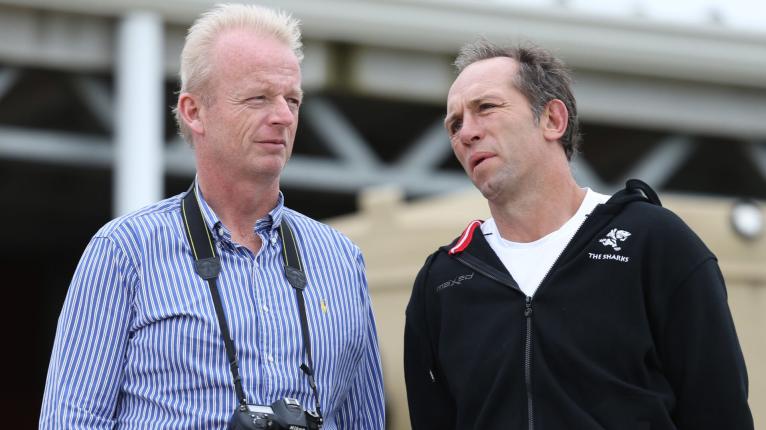
“There was a group of 28 players and they would have bought into the message to varying degrees. There would have been a significant number of people within South African rugby who just considered that black people were disinterested in rugby, not really involved in rugby and frankly didn’t care whether they were involved or not.
“Looking back on it, the anthem seemed like a natural and obvious thing to do but at the time it didn’t seem an obvious thing. It was somewhat of a joke in South Africa that the predominately white rugby audiences would sort of mumble through Nkosi Sikelel’ iAfrika, not knowing the words, and then when Die Stem would come on would sing at full throttle and knew the words completely.
“It was very important that the team did not mumble through Nkosi Sikelel’ iAfrika. Morne du Plessis, the team manager, organised for a friend of his, professor Anne Munnik, to come in and teach the squad the Nkosi Sikelel’ iAfrika.
“Hennie Le Roux, the centre who was quite proficient in some African languages, helped with that process so the team learned it. That was all fine and then on the night before the opening game where it was going to be the first time they were going to sing the anthem and where it was so important that the team was seen to be singing the anthem, I went down to Newlands and checked with SABC, the broadcasters.
“The director said a choir had pre-recorded a shortened composite anthem, a few verses of each song, and there was nothing you can do. I said, ‘We can’t compromise on this, we have got to get this right. There is no way we can get the players to relearn an anthem on the morning of the game’.
BREAKING: Nelson Mandela has been posthumously inducted into the World Rugby Hall of Fame: http://t.co/98mZKcJ4ixhttps://t.co/n7rCnxRLi8
— World Rugby (@WorldRugby) October 3, 2015
“So we dragged 40 members of the choir out of their hotel in Cape Town down to re-record the full version of Nkosi Sikelel’ iAfrika and the full version of Die Stem at about 11 o’clock at night to lay down the track. They all got back to bed at about half-past midnight and that is how the next day we actually did play the full version of Nkosi Sikelel’ iAfrika and the full version of Die Stem and the players sang both anthems perfectly.”
It wasn’t the only issue where Griffiths refused to compromise, the administrator particularly annoyed that some Springboks fans would still wave the old South African flag at games. There was one particular confrontation before the final pool game versus Canada in Port Elizabeth. “I looked across from the main side of the ground to the huge terrace and there was one guy holding a massive old South African flag, the orange, white and blue.
“That message of the old flag was very much supportive of the old South Africa and was the flag associated with apartheid, exactly contrary to the message we were wanting to send and it was in full view of all the TV cameras.
“I thought half an hour before the game I had to do something about this and get this flag taken down. I walked around the ground through the crowd, made my way through the terrace which was packed and got right up to the guy who was waving this flag. I said, ‘This isn’t helpful’. He said, ‘What do you mean, it’s a free country?’ I said, ‘It is a free country but the symbol of the free country is that flag over there, not the flag you’re waving’. This guy looked at me and said, ‘Oh sorry, Mr Griffiths’ and he put it down.
“It was strange having this rugby tournament happening at the time when there was so much fluidity in the way people were thinking about the country and looking at the country. Of course, that culminated in a final where the crowd started chanting ‘Nelson, Nelson, Nelson’. That idea that a primarily white crowd could be chanting the name of Nelson Mandela was unthinkable the year before.”
Watch: Legendary South African Musician, PJ Powers lifts our spirits with her iconic song 'Jabulani' dedicated to our fallen hero, Chester Williams. Indeed, though we mourn, our hearts are filled with joy for the great privilege of having known this legend. #RIPChesterWilliams pic.twitter.com/RA5lOWCaJT
— Ambassador Nathi Mthethwa (@NathiMthethwaSA) September 14, 2019
So too the name of Williams, the only non-white player on the Springboks who nearly missed out thorough a pre-finals hamstring injury. “The pressure he felt running up to the tournament was huge,” recalled Griffiths. “His face was everywhere, on every billboard. The pressure was massive on him and it may have taken some toll.
“Then, of course, we had the suspensions of Pieter Hendriks and James Dalton against Canada and we were able to bring Chester back into the squad as a result for the quarter-final when he scored four tries against Western Samoa. At that point I remember saying to Morne du Plessis, every stroke of fate seemed to be a stroke on our side.”
Griffiths had his own superstitions surrounding the Springboks. “I never sat down in any game in the finals,” he said. “In the opening match at Newlands I had given away tickets just before the beginning and I didn’t have a seat anywhere so I watched every game from the players’ tunnel throughout the whole tournament.
“In fact, there was another thing where someone gave me a blazer that I had to give to someone just before the opening game against Australia. I was holding a plastic coat hanger in the players’ tunnel at Newlands and that became a superstition. I thought if we are going to keep on winning I would have to continue holding a coat hanger and stand in the players’ tunnel.
“I did the same in the final, holding the coat hanger, and I remember Mark Andrews had just come off because he was injured, Rudolf Straeuli had just gone on. I was standing next to Mark in the players’ tunnel and when the drop goal went over it just felt there was something guiding this campaign to end the way everybody wanted it to end.”
The celebrations that followed for weeks and months live vibrantly on in Griffiths’ memory. “When you see the impact the tournament had on the country, on people from all communities and all backgrounds, it was astonishing because when you’re in a tournament you are in some way of a bubble with the team and you don’t necessarily see what has happened in the wider country.
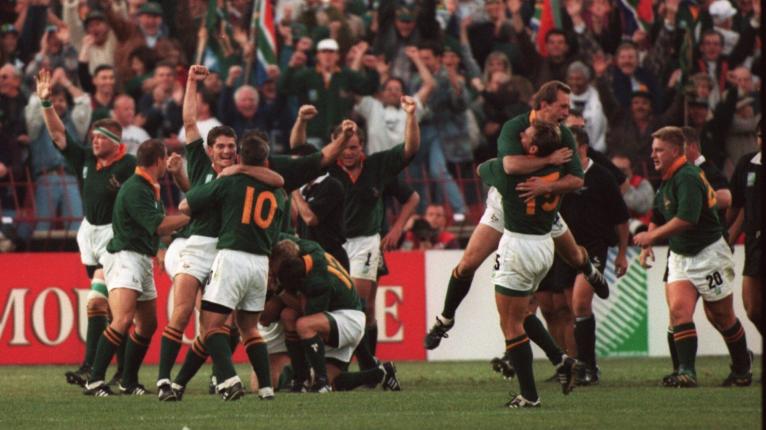
“I did a book about the country a year afterwards and spoke to a lot of people about their experience of the final day. It even had people like John Smit (the 2007 cup-winning captain), who was a schoolboy in Pretoria. He got a call the night before the game because his friend’s father was not feeling well and couldn’t go to the game, so John got a ticket for the 1995 final as a schoolboy the night before, came down to the game and watched it. It’s a sort of when they shot Kennedy moment, most South Africans will be able to remember what they were doing on the day of the final at Ellis Park.”
The dizzying euphoria eventually lost some fizz, though. Griffiths was ousted the following February, and some years later Mandela was a witness in court as SA Rugby tried to stare down the Government. “I was finished because I wanted that World Cup to change the game and I pushed through more affirmative action policies at Craven Week which were unpopular. I was very clear about the agenda I wanted to follow, which was transforming the game very quickly and using the opportunity of the World Cup to transform the game. The executive committee, many of them didn’t want to follow that agenda and their influence weighed more heavily on Louis Luyt than mine and that is why I got fired.
“The reality is that within three years South African rugby was putting Nelson Mandela in the dock because the Government wanted to appoint a commission of enquiry into rugby and SA Rugby fought that commission in the court and Nelson Mandela was literally standing in the dock taking questions as a witness. It did turn sour. The tournament created an opportunity for South African rugby to change and it’s a pity that that opportunity was largely not taken.
“That legacy was largely wasted. There was an opportunity to truly transform South African rugby and to give it an incredible role within the country and sadly that opportunity was largely wasted because the South African rugby board at that time just didn’t have the will, the desire to make the changes that were required. There was still too many people there who felt that rugby was a white man’s game and should be kept as such.
“Where the 1995 World Cup still has a role is it is a moment you can’t take away for South Africans black and white as a nation who realised what the country could achieve together. This was the country that had been very largely isolated, a pariah state for 20, 30 years. Suddenly they came back and won a World Cup.
“It wasn’t a massively multi-cultural team but they won a World Cup, a Springbok team won representing the whole country. It created an image of a united country winning on the international stage and that is why that profile of Mandela, the trophy, that image is still emotionally significant for tens of millions of South Africans because it was a moment when the united country was shown.
“People actually looked at this and thought, ‘Wow, this can actually work. This country has actually got a future as a united, democratic nation’. That significance will always endure but the specific rugby significance, the opportunity was largely wasted.”

































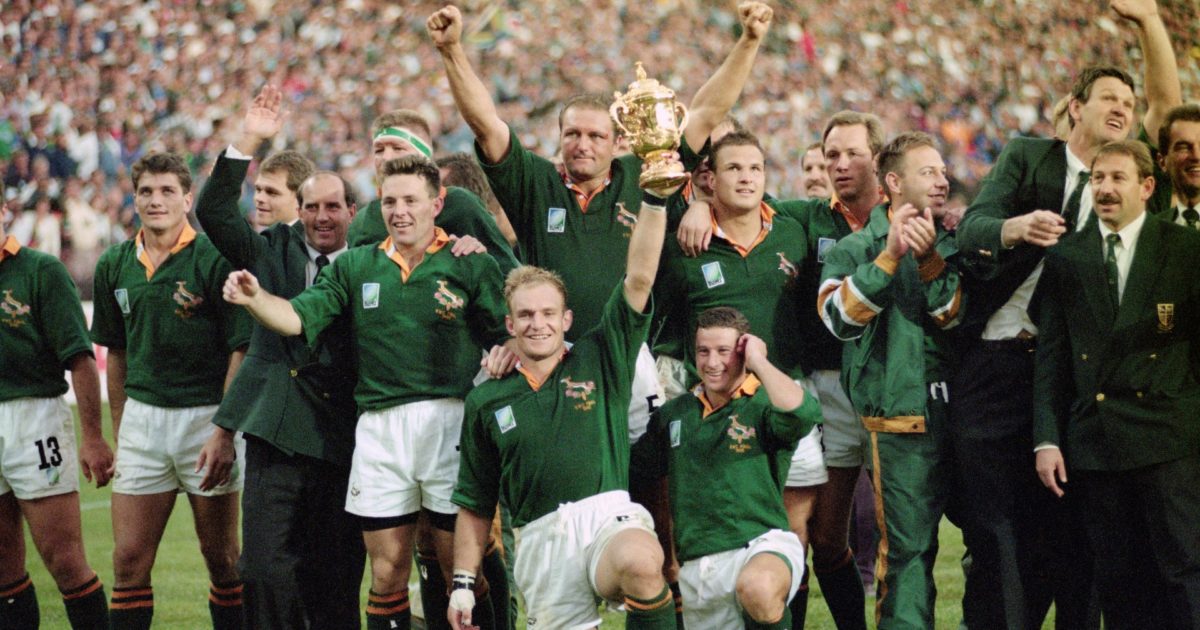

Erm South africa are current world Cup holders fool
But the country is divided ?
He's a fool? What exactly have you achieved in Rugby?
The food-poisoning of the All Blacks, and the drumbeating outside the players' hotel, ensured that South Africa has not been awarded another World Cup tournament since then.